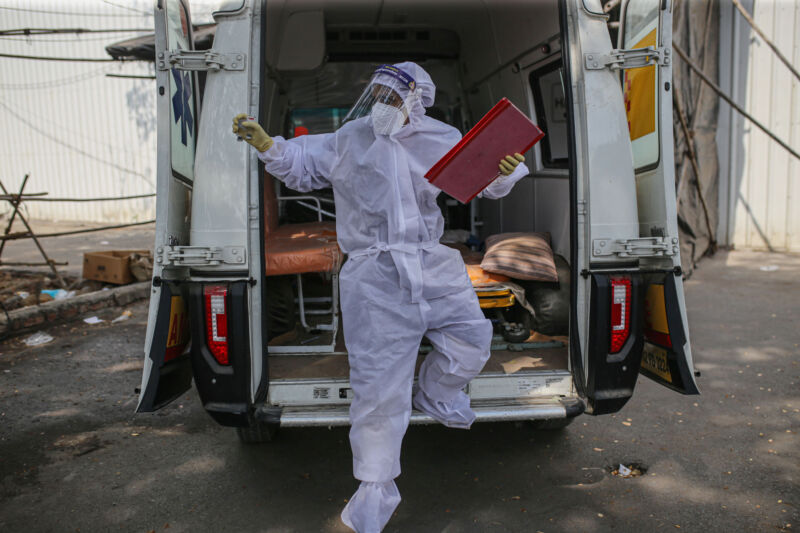
As the pandemic coronavirus continues to ravage India, doctors are reporting a disturbing uptick in cases of a rare, potentially fatal fungal infection among people recovered or recovering from COVID-19.
The infection is called mucormycosis, or sometimes “black fungus” in media reports, and it appears to be attacking COVID-19 patients through the nose and sinuses, where it can aggressively spread to facial bones, the eyes, and even the brain (rhinocerebral mucormycosis). In other cases, the fungus can also attack the lungs, breaks in the skin, and the gastrointestinal system or spread throughout the body in the blood stream.
A classic feature of mucormycosis is tissue necrosis—the death of flesh, essentially—which in the rhinocerebral form of the disease can lead to black, discolored lesions on the face, particularly on the bridge of the nose and the roof of the mouth. Mucormycosis is fatal in around 50 percent of cases.
If the fungus is able to spread to the eyes, patients may develop blurred vision, drooping eyelids, swelling, and vision loss. Patients may even need to have their eyes surgically removed to prevent the infection from spreading further, according to doctors who spoke to the BBC.
Dr. Akshay Nair, a Mumbai-based eye surgeon, told the BBC that he treated 40 patients with mucormycosis in April. Eleven of them needed to have an eye surgically removed.
The total number of mucormycosis cases in India is unclear, but media reports have tallied dozens to hundreds of cases. Dr. Renuka Bradoo, head of the ear, nose, and throat wing of Sion Hospital in Mumbai, told the BBC that doctors there have seen 24 cases of mucormycosis in the past two months. Usually, they see only about six cases in a whole year.
Worse for diabetics
A report in The New York Times out of New Delhi relayed that local news media in the western state of Maharashtra, which includes Mumbai, had tallied around 200 cases. In the western state of Gujarat, state officials have reportedly ordered 5,000 doses of amphotericin B, an antifungal medicine used to treat mucormycosis.
The startling increase in cases may be explained by India’s high number of people with diabetes, coupled with poor hygiene amid the critical COVID-19 surge, doctors speculate. Mucormycosis is known to strike people who have compromised immune systems, especially people with diabetes—and those with poorly controlled diabetes in particular.
Not only does diabetes dampen immune responses, welcoming invasive fungi, it also provides a comfortable environment for the infections. Mucormycosis is caused by mucormycetes, a ubiquitous group of molds that live in soil and decaying organic matter, like wood, leaves, and compost. These molds love iron-rich, acidic environments, and diabetic ketoacidosis—a complication of diabetes that causes the blood to become acidic—is a key risk factor for developing mucormycosis. A literature review published in the New England Journal of Medicine in 1999 estimated that about 50 percent of all cases of rhinocerebral mucormycosis occur in people with diabetes.
India doesn’t have exceptionally high rates of diabetes compared with other countries. But because of its population of over 1.36 billion people, the country has one of the highest raw totals of diabetes cases in the world, estimated to be around 77 million people, second only to China. India also has some of the highest estimated levels of death and disability from diabetes, according to a study published in the journal Scientific Reports last year.
“Triple whammy”
Adding to this problem is the current COVID-19 crisis crippling India’s healthcare system. With hospitals overwhelmed, experts who spoke with the Times noted that many COVID-19 patients are being treated with oxygen at home without proper hygiene. Moreover, many COVID-19 patients are given powerful steroids—which further tamps down the immune system.
“You’ve got a high rate of mucormycosis, you’ve got a lot of steroids—maybe too much—being used, and then you’ve got diabetes, which is not being well controlled or managed,” David Denning, an expert in fungal infections at Manchester University, told the Associated press. It’s a “triple whammy,” he said.
https://arstechnica.com/?p=1764334

